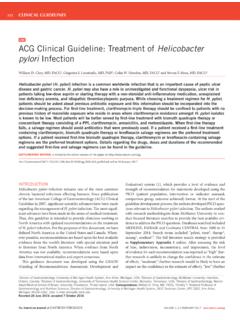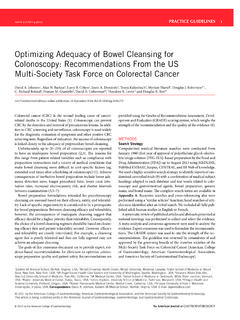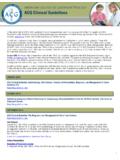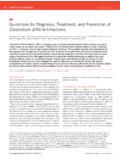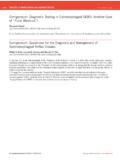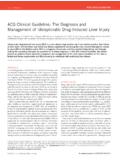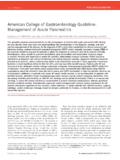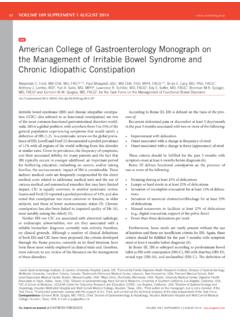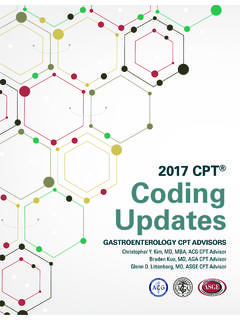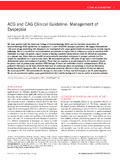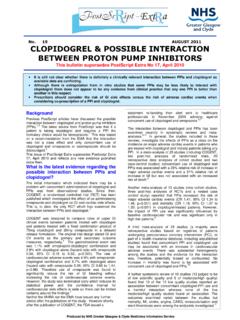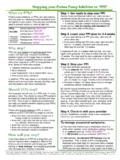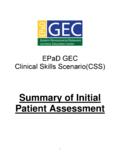Transcription of ACCF&ACG&AHA 2010 Expert Consensus Document on the ...
1 Nature publishing groupthe red section2533 Writing Committee MembersNeena S. Abraham, MD, FACG, Chair*; Mark A. Hlatky, MD, FACC, FAHA, Vice Chair Elliott M. Antman, MD, FACC, FAHA ; Deepak L. Bhatt, MD, MPH, FACC, FAHA David J. Bjorkman, MD, MSPH, FACG*; Craig B. Clark, DO, FACC, FAHA Curt D. Furberg, MD, PhD, FAHA ; David A. Johnson, MD, FACG* Charles J. Kahi, MD, MSc, FACG*; Loren Laine, MD, FACG*Kenneth W. Mahaffey,MD, FACC ; Eamonn M. Quigley, MD, FACG*; James Scheiman, MD, FACG*; Laurence S. Sperling, MD, FACC, FAHA ; Gordon F. Tomaselli, MD, FACC, FAHA *American College of Gastroenterology Representative; American College of Cardiology Foundation Representative; American Heart Association Representative This Document was approved by the American College of Gastroenterology (ACG) Board of Trustees in September 2010, by the American College of Cardiology Foundation (ACCF) Board of Trustees in September 2010, and by the American Heart Associa-tion (AHA) Science Advisory and Coordinating Committee in September 2010.
2 The American College of Gastroenterology requests that this Document be cited as follows: Abraham NS, Hlatky MA, Antman EM, Bhatt DL, Bjorkman DJ, Clark CB, Furberg CD, Johnson DA, Kahi CJ, Laine L, Mahaffey KW, Quigley EM, Scheiman J, Sper-ling LS, Tomaselli GF (. ACCF/ACG/AHA 2010 Expert Consensus Document on the concomitant use of proton pump inhibitors and thienopyridines: a focused update of the ACCF/ACG/AHA 2008 Expert Consensus Document on reducing the gastrointestinal risks of antiplatelet therapy and NSAID use. Am J Gastroenterol 2010;105:2533 2549; article has been copublished in the Journal of the American College of Cardiology and : This Document is available on the World Wide Web sites of the American College of Gastroenterology (via the College s American Journal of Gastroenterology web site: ), the American College of Cardiology ( ), and the American Heart Association ( ). For copies of this Document , please contact the Nature Publishing Group Reprint Department, e-mail: Multiple copies, modification, alteration, enhancement, and/or distribution of this Document are not permitted without the express permission of the American College of Gastroenterology.)
3 Please contact Nature Publishing Group s permis-sions department at 2010 Expert Consensus Document on the Concomitant Use of Proton Pump Inhibitors and Thienopyridines: A Focused Update of the ACCF/ACG/AHA 2008 Expert Consensus Document on Reducing the Gastrointestinal Risks of Antiplatelet Therapy and NSAID Usenature publishing group2533 AccF/AcG/AhA Expert Consensus documentwhite paper 2010 by the ACCF, the ACG and the AHA the American Journal of GastroenteroloGyWHITE PAPER2534the American Journal of GastroenteroloGy VolumE 105 | dECEmbER 2010 : 0002-9270 doi: AJG Task Force Members Robert A. Harrington, MD, FACC, Chair Eric R. Bates, MD, FACC ; Deepak L. Bhatt, MD, MPH, FACC Victor A. Ferrari, MD, FACC; John D. Fisher, MD, FACC Timothy J. Gardner, MD, FACC; Federico Gentile, MD, FACC Mark A. Hlatky, MD, FACC; Alice K. Jacobs, MD, FACC Sanjay Kaul, MBBS, FACC; David J. Moliterno, MD, FACC Howard H. Weitz, MD, FACC; Deborah J.
4 Wesley, RN, BSNTABLE OF CONTENTS Preamble 1. Introduction Summary of Findings and Consensus Recommendations 2. Role of Thienopyridines in CV Disease 3. Risk of GI Bleeding and Related Mortality Associated With Clopidogrel Alone or in Combination 4. Strategies to Prevent Thienopyridine-Related Upper GI Bleeding Histamine H2 Receptor Antagonists Proton Pump Inhibitors 5. Drug Metabolism: Thienopyridine, H2RA, and PPI Thienopyridine Metabolism H2RA Metabolism PPI Metabolism 6. Hypotheses Regarding the PPI-Antiplatelet Interaction Reduced Biological Action of Clopidogrel Through Competitive Metabolic Effects of CYP2C19 Reduced Biological Action of Clopidogrel Related to Genetic Polymorphisms 7. Evidence-Based Review: PPI and Clopidogrel/ Thienopyridine Pharmacokinetic and Pharmacodynamic Effect 8. PPI and Clopidogrel/Prasugrel Clinical Efficacy Do PPIs Decrease Clinical Efficacy of Clopidogrel or Prasugrel?
5 Randomized Clinical TrialsWHITE PAPER2535 2010 by the ACCF, the ACG and the AHA the American Journal of GastroenteroloGynature publishing Does the Choice of PPI Matter? Timing of Dosing to Minimize Interactions 9. Conclusions The Assessment of Epidemiologic Evidence Supporting a Significant Clinical Interaction Between PPIs and Thienopyridines Risk/Benefit Balance: GI Bleed Risk Versus CV Event Risk Is H2RA a Reasonable Alternative and in Which Population? Unanswered Questions and Areas for Future Research Appendix 1. Relevant Author Relationships With Industry and Other Entities Appendix 2. Relevant Peer Reviewer Relationships With Industry and Other Entities References Abbreviation List ACS = acute coronary syndromes; ADP = adenosine diphosphate; CI = confidence interval; CV = cardiovascular; GI = gastrointestinal; HR = hazard ratio; H2RA = histamine H2 receptor antagonist; MI = myocardial infarction; NNH = number-needed-to-harm; NSAID = nonsteroidal anti-inflammatory drug; OR = odds ratio; PCI = percutaneous coronary intervention; PPI = proton pump inhibitor; RCT = randomized clinical trial; RR = relative risk; VASP = vasodilator-stimulated phosphoprotein WHITE PAPER2536the American Journal of GastroenteroloGy VolumE 105 | dECEmbER 2010 : 0002-9270 doi: AJG This Expert Consensus Document was developed by the Ameri-can College of Cardiology Foundation (ACCF), the American College of Gastroenterology (ACG), and the American Heart Association (AHA).
6 Expert Consensus documents inform prac-titioners, payers, and other interested parties of the opinion of ACCF and Document cosponsors concerning evolving areas of clinical practice or medical technologies. Expert Consensus documents cover topics for which the evidence base, experi-ence with technology, or clinical practice is not considered suf-ficiently well developed to be evaluated by the formal ACCF/AHA Practice Guidelines process. Often, the topic is the subject of considerable ongoing investigation. Thus, the reader should view the Expert Consensus Document as the best attempt of the ACCF and Document cosponsors to inform clinical practice in areas where rigorous evidence may not yet be available. To avoid actual, potential, or perceived conflicts of interest that may arise as a result of industry relationships or personal interests among the writing committee, all members of the writing committee, as well as peer reviewers of the docu-ment, are asked to disclose all current health care-related relationships and those existing 12 months before initiation of the writing effort.
7 The ACCF Task Force on Clinical Expert Consensus Documents (CECD) reviews these disclosures to determine which companies make products (on market or in development) that pertain to the Document under devel-opment. Based on this information, a writing committee is formed to include a majority of members with no relevant relationships with industry (RWI), led by a chair with no rel-evant RWI. Authors with relevant RWI are not permitted to draft or vote on text or recommendations pertaining to their RWI. RWI are reviewed on all conference calls and updated as changes occur. Author and peer reviewer RWI pertinent to this Document are disclosed in Appendixes 1 and 2, respec-tively. Additionally, to ensure complete transparency, authors comprehensive disclosure information including RWI not pertinent to this Document is available online. Disclosure information for the ACCF Task Force on CECD is also avail-able online at , as well as the ACCF disclosure policy for Document devel-opment at The work of the writing committee was supported exclusively by the ACCF without commercial support.
8 Writing committee members volunteered their time to this effort. Conference calls of the writing committee were confidential and attended only by committee InTRoduCTIon The potential benefits of antiplatelet therapy for atherosclerotic cardiovascular (CV) disease have been amply demonstrated over the past 2 decades, especially with regard to the role of thienopyridine drugs in preventing stent thrombosis. How-ever, antiplatelet agents increase the risk of bleeding associated with mucosal breaks in the upper and lower gastrointestinal (GI) tract. Rational use of thienopyridines is based on weigh-ing their risks against their benefits. The magnitude of the risks may vary among patients, based on their history and clinical characteristics, as may the magnitude of the benefits. An earlier Expert Consensus Document , Reducing the GI Risks of Antiplatelet and NSAID Use, recommended the use of a proton pump inhibitor (PPI) in patients with risk factors for upper GI bleeding treated with dual antiplatelet therapy (1).
9 Since its publication, evidence of a potential adverse drug interaction between PPIs and thienopyridines has emerged (2). Many recent investigations of this potential adverse interaction have been performed, using a variety of research designs. It has been difficult for practitioners to assimilate this flood of infor-mation and to develop optimal treatment strategies for manag-ing patients who might benefit from antiplatelet therapy, yet who might suffer from GI bleeding. The purpose of this doc-ument is to review critically the recent developments in this area, provide provisional guidance for clinical management, and highlight areas of future research necessary to address cur-rent knowledge Summary of Findings and Consensus Recommendations 1. Clopidogrel reduces major CV events compared with placebo or aspirin. 2. Dual antiplatelet therapy with clopidogrel and aspirin, compared with aspirin alone, reduces major CV events in patients with established ischemic heart disease, and it reduces coronary stent thrombosis but is not routinely rec-ommended for patients with prior ischemic stroke because of the risk of bleeding.
10 3. Clopidogrel alone, aspirin alone, and their combination are all associated with increased risk of GI bleeding. 4. Patients with prior GI bleeding are at highest risk for recurrent bleeding on antiplatelet therapy. Other clinical characteristics that increase the risk of GI bleeding include advanced age; concurrent use of anticoagulants, steroids, or nonsteroidal anti-inflammatory drugs (NSAIDs) including aspirin; and Helicobacter pylori infection. The risk of GI bleeding increases as the number of risk factors increases. 5. Use of a PPI or histamine H2 receptor antagonist (H2RA) reduces the risk of upper GI bleeding compared with no therapy. PPIs reduce upper GI bleeding to a greater degree than do H2 RAs. WHITE PAPER2537 2010 by the ACCF, the ACG and the AHA the American Journal of GastroenteroloGynature publishing Group6. PPIs are recommended to reduce GI bleeding among patients with a history of upper GI bleeding. PPIs are appropriate in patients with multiple risk factors for GI bleeding who require antiplatelet therapy.
